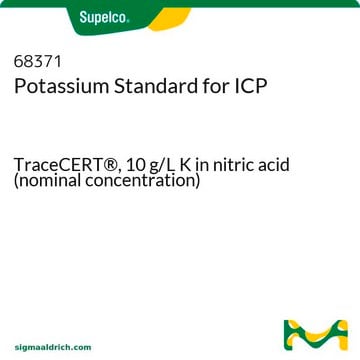218928
Sodium dichloroisocyanurate
96%
Synonyme(s) :
NaDCC, 3,5-Dichloro-2-hydroxy-4,6-s-triazinedione sodium salt, Dichloro-s-triazinetrione sodium salt
About This Item
Produits recommandés
Niveau de qualité
Pureté
96%
Forme
(Granules or Granular Powder)
Pertinence de la réaction
reagent type: oxidant
Chaîne SMILES
[Na]N1C(=O)N(Cl)C(=O)N(Cl)C1=O
InChI
1S/C3HCl2N3O3.Na/c4-7-1(9)6-2(10)8(5)3(7)11;/h(H,6,9,10);/q;+1/p-1
Clé InChI
MSFGZHUJTJBYFA-UHFFFAOYSA-M
Vous recherchez des produits similaires ? Visite Guide de comparaison des produits
Description générale
Application
- N-monochlorination and dehydrochlorination of amino esters
- Chlorination to detect ammonium via formation of colored zebra-bands in a deteting tube
- Synthesis of antimicrobial polyurethane additives to control biofilm
- Preparation of bromochloroisocyanurate for electrophilic cobromination of alkenes and bromination of arenes
- An oxidizing reagent for the preparation of tetrazene(N–N=N–N)-linked bi(1,2,4-triazole) from 4-amino-1,2,4-triazole by oxidizing N-NH2 functional group.
- A chlorinating agent for the N-monochlorination of α-amino esters and α-amino-β-diesters.
It can also be used to prepare NaDCC immobilized magnetic nano-Fe3O4 material, which is used as an excellent disinfectant as well as a wastewater treatment agent.
Clause de non-responsabilité
Mention d'avertissement
Danger
Mentions de danger
Conseils de prudence
Classification des risques
Acute Tox. 4 Oral - Aquatic Acute 1 - Aquatic Chronic 1 - Eye Dam. 1 - Ox. Sol. 2 - Skin Corr. 1A - STOT SE 3
Organes cibles
Respiratory system
Risques supp
Code de la classe de stockage
4.1A - Other explosive hazardous materials
Classe de danger pour l'eau (WGK)
WGK 2
Point d'éclair (°F)
Not applicable
Point d'éclair (°C)
Not applicable
Équipement de protection individuelle
Eyeshields, Gloves, type P3 (EN 143) respirator cartridges
Faites votre choix parmi les versions les plus récentes :
Déjà en possession de ce produit ?
Retrouvez la documentation relative aux produits que vous avez récemment achetés dans la Bibliothèque de documents.
Les clients ont également consulté
Notre équipe de scientifiques dispose d'une expérience dans tous les secteurs de la recherche, notamment en sciences de la vie, science des matériaux, synthèse chimique, chromatographie, analyse et dans de nombreux autres domaines..
Contacter notre Service technique














